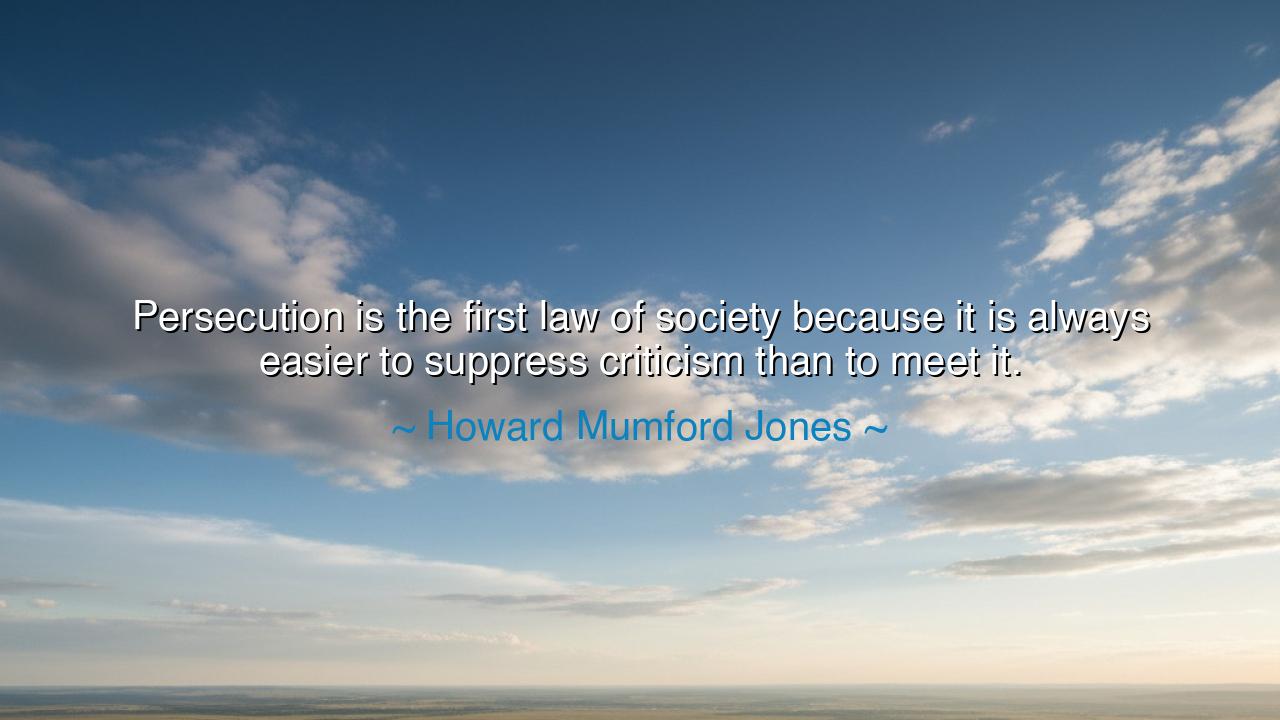
Persecution is the first law of society because it is always
Persecution is the first law of society because it is always easier to suppress criticism than to meet it.






Howard Mumford Jones, the scholar who wrestled with the spirit of history, once declared: “Persecution is the first law of society because it is always easier to suppress criticism than to meet it.” His words are not spoken lightly, nor do they flatter humanity. They reveal a painful truth: that the instinct of power and the reflex of community often lean toward silencing the questioner rather than enduring the discomfort of their challenge. It is a truth both ancient and modern, echoing through every age where voices were crushed for daring to disturb the order of the day.
The meaning is grim but illuminating. Persecution arises because it demands less effort than engagement. To meet criticism with reason, with dialogue, with reform—this requires humility, patience, and courage. But to silence the critic, to banish, imprison, mock, or kill them—this is swift and decisive, and thus it has become the “first law” of fearful societies. Jones points out not what is noble, but what is habitual: the easier path is taken, and it is the path of suppression. This is why the story of humanity is littered with martyrs of conscience, prophets without honor, and thinkers exiled or slain for their words.
History gives us one of its most vivid testimonies in the trial of Socrates. Athens, the city that birthed philosophy and democracy, turned against the man who asked too many questions. His criticism revealed the ignorance of the wise, the corruption of leaders, and the hypocrisy of citizens. Instead of meeting his challenges with reason, the city found it easier to silence him with hemlock. Thus Athens, for all its greatness, obeyed the “first law” of persecution rather than the higher law of truth. The death of Socrates stands forever as a warning: a society that suppresses criticism betrays its own soul.
Another example lies in the life of Galileo. When he declared that the earth moved around the sun, his discovery shook the powers of his time. The church, fearing the collapse of authority, found it easier to persecute him than to wrestle with his evidence. Though truth was on Galileo’s side, he was silenced and forced into recantation. Here again we see Jones’s insight: it was less costly to suppress criticism than to engage it, even at the price of delaying humanity’s progress. But though Galileo was stifled, the truth he revealed eventually triumphed, showing us that suppression is never eternal.
Jones’s words are not only a critique of rulers but of ordinary people. Communities, families, even friendships often follow this same law. It is easier to dismiss the dissenting voice, to exile the black sheep, to persecute the nonconformist, than to listen, reflect, and change. But such ease carries great danger. A society that continually silences its critics builds a fragile shell around itself, brittle and doomed to fracture when reality finally breaks through. Strength does not come from silencing dissent, but from bearing it, wrestling with it, and being refined by it.
The lesson is clear: resist the temptation of the “first law.” Do not fall into the ease of persecution when faced with words that sting. Instead, meet criticism with courage. Examine it, even if it wounds your pride. Ask whether it contains truth, and if it does, let it change you. A nation, a community, a soul that learns to embrace criticism rather than suppress it will rise to greater wisdom and strength.
Practical action follows from this. Defend freedom of speech and conscience in your society, for these are the bulwarks against persecution. In your own life, welcome correction, even when it is uncomfortable. Support the voices of the marginalized, who are often silenced because their criticism is too piercing to be borne by the comfortable. And above all, cultivate the discipline to meet words with reason rather than fear.
Thus, let Jones’s words be remembered not as resignation, but as a challenge: “Persecution is the first law of society.” It may be the instinct of power, but it need not be our destiny. For every generation must choose: will we walk the easy road of silencing dissent, or the harder but nobler road of listening, engaging, and transforming? Those who choose the latter will build not only stronger societies but freer souls, and in doing so, they will rise above the law of fear into the realm of truth.






AAdministratorAdministrator
Welcome, honored guests. Please leave a comment, we will respond soon